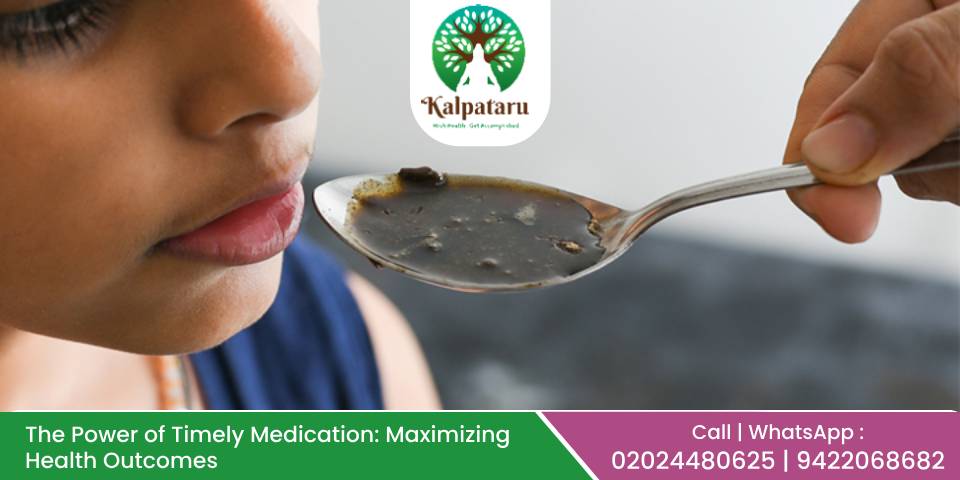In the realm of healthcare, adherence to medication schedules stands as a critical component in achieving optimal health outcomes. The simple act of taking prescribed medications on time can significantly impact an individual’s well-being and pave the way for a healthier, more fulfilling life. In this blog, we delve into the importance of timely medication and how it plays a pivotal role in maximizing health outcomes.
Understanding Timely Medication:
When a healthcare professional prescribes medication, it is often accompanied by specific instructions regarding dosage and timing. Timely medication refers to the conscientious adherence to these instructions, ensuring that doses are taken at the prescribed times and intervals.
Why Timely Medication Matters?
- Efficacy of Treatment: Adhering to prescribed medication schedules ensures that the therapeutic levels of the drug remain consistent in the body. This consistency is crucial for the medication to perform optimally and produce the intended therapeutic effects. Irregular intake or missed doses can hinder the treatment’s efficacy, potentially reducing its effectiveness in managing a condition or illness.
- Disease Management: For chronic conditions such as diabetes, hypertension, or autoimmune disorders, strict adherence to medication schedules is paramount. Consistent medication intake can help control symptoms, prevent disease progression, and minimize complications, thereby enhancing the overall quality of life.
- Avoiding Complications: Missing doses or irregular medication schedules can lead to complications. For instance, in antibiotic treatments, inconsistent intake can contribute to antibiotic resistance, rendering the medication less effective in combating infections. Similarly, in conditions like epilepsy, irregular medication adherence can trigger seizures.
- Long-Term Health Benefits: Consistently following prescribed medication schedules not only addresses immediate health concerns but also contributes to long-term health benefits. It can reduce the risk of disease exacerbation, hospitalizations, and the need for more aggressive treatments, ultimately saving both time and resources.
Overcoming Challenges in Adherence:
While understanding the significance of timely medication is crucial, adhering to schedules can pose challenges for many individuals. Factors such as forgetfulness, complex dosing regimens, financial constraints, or side effects may hinder adherence. However, several strategies can help overcome these challenges:
- Set Reminders: Utilize alarm clocks, smartphone apps, or pill organizers to prompt medication intake.
- Simplify Regimens: Discuss simpler dosing schedules or alternative medications with your healthcare provider.
- Financial Assistance: Seek assistance programs or generics to alleviate financial burdens associated with medications.
- Open Communication: Discuss any concerns or side effects with your healthcare provider rather than discontinuing medication.
For more information and treatment modalities watch our informative video
Ayurvedic Principles and Medication Timing:
- Body Functions and Doshas: The body operates based on solar energy and is affected by three doshas: Vata (air), Pitta (fire), and Kapha (earth and water). Timing-wise, Kapha dosha prevails from 6 am to 10 am, Pitta dosha from 10 am to 2 pm, and Vata dosha from 2 pm to 6 pm. Evening also observes Kapha dominance from 6 pm to 10 pm.
- Medication and Dosha Influence: Medications taken during specific dosha periods work more effectively on the respective dosha imbalances. For example, treating Kapha imbalances should consider administering around 6 am or 10 pm when Kapha dosha is dominant. Likewise in pitta and Vat doshas
Medication and Digestive Phases:
Pre-meal medications predominantly work on Apana Vayu, affecting areas such as the uterus, colon, large intestine, urinary bladder, or the process of excretion.
- Medication and Nighttime: Medicines taken before sleep, known as swapn kal medications, work on aspects related to the brain, intelligence, or sleep.
- Medication Timing: Specific medicines are given intermittently or in acute conditions as needed. Medicines during meals are helpful for digestive issues like chronic diarrhea, irritable bowel syndrome, or ulcerative colitis, improving digestive power. Some medicines are best taken in the morning on an empty stomach, allowing quick absorption and producing favorable results without directly interacting with food.
- Tonics and Strengthening Medicines: Tonics or strengthening medicines work on an empty stomach to enhance the body’s strength, immunity, and disease resistance.
- Gastric Medications: Given between meals, aid in conditions related to gastric discomfort, improving digestion and alleviating gas or stomach disturbances.
Conclusion:
Timely medication intake is a cornerstone of successful treatment plans and plays an integral role in optimizing health outcomes. By recognizing the importance of adhering to prescribed schedules and overcoming challenges in adherence, individuals can take charge of their health and work towards achieving better overall well-being.
This organized version provides a clear breakdown of Ayurvedic principles related to doshas, medication timing, and the influence of medicines on different bodily functions and phases.
Remember, the decision to adhere to medication schedules isn’t just about following instructions; it’s about taking proactive steps towards a healthier and more fulfilling life. Always consult with Ayurveda Specialist in Pune to create a personalized plan that suits your needs and ensures the best possible health outcomes.
Dr. Manoj Deshpande and Dr. Aparna Deshpande at Kalpataru Ayurvediya Chikitsalaya™ Clinic provide the best Ayurvedic Treatment for Psoriasis & various diseases in Pune, Maharashtra. For more information about our comprehensive treatment options, or to request an appointment with the best Ayurvedic Doctor in Pune, call +919422068682 / +919764837167 / 020-24480625 or Click on Book an Appointment.

